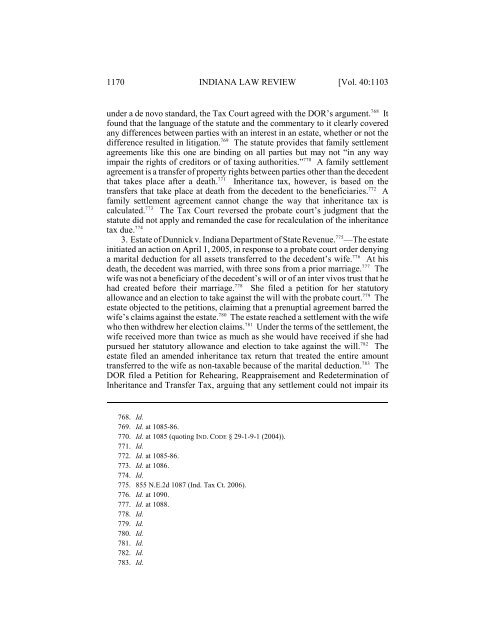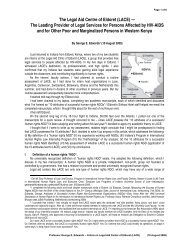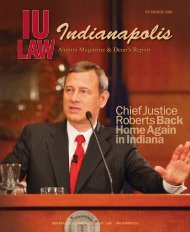Recent Developments in Indiana Taxation - I.U. School of Law ...
Recent Developments in Indiana Taxation - I.U. School of Law ...
Recent Developments in Indiana Taxation - I.U. School of Law ...
You also want an ePaper? Increase the reach of your titles
YUMPU automatically turns print PDFs into web optimized ePapers that Google loves.
1170 INDIANA LAW REVIEW [Vol. 40:1103<br />
768<br />
under a de novo standard, the Tax Court agreed with the DOR’s argument. It<br />
found that the language <strong>of</strong> the statute and the commentary to it clearly covered<br />
any differences between parties with an <strong>in</strong>terest <strong>in</strong> an estate, whether or not the<br />
769<br />
difference resulted <strong>in</strong> litigation. The statute provides that family settlement<br />
agreements like this one are b<strong>in</strong>d<strong>in</strong>g on all parties but may not “<strong>in</strong> any way<br />
770<br />
impair the rights <strong>of</strong> creditors or <strong>of</strong> tax<strong>in</strong>g authorities.” A family settlement<br />
agreement is a transfer <strong>of</strong> property rights between parties other than the decedent<br />
771<br />
that takes place after a death. Inheritance tax, however, is based on the<br />
772<br />
transfers that take place at death from the decedent to the beneficiaries. A<br />
family settlement agreement cannot change the way that <strong>in</strong>heritance tax is<br />
773<br />
calculated. The Tax Court reversed the probate court’s judgment that the<br />
statute did not apply and remanded the case for recalculation <strong>of</strong> the <strong>in</strong>heritance<br />
tax due. 774<br />
775<br />
3. Estate <strong>of</strong> Dunnick v. <strong>Indiana</strong> Department <strong>of</strong> State Revenue. —The estate<br />
<strong>in</strong>itiated an action on April 1, 2005, <strong>in</strong> response to a probate court order deny<strong>in</strong>g<br />
776<br />
a marital deduction for all assets transferred to the decedent’s wife. At his<br />
777<br />
death, the decedent was married, with three sons from a prior marriage. The<br />
wife was not a beneficiary <strong>of</strong> the decedent’s will or <strong>of</strong> an <strong>in</strong>ter vivos trust that he<br />
778<br />
had created before their marriage. She filed a petition for her statutory<br />
779<br />
allowance and an election to take aga<strong>in</strong>st the will with the probate court. The<br />
estate objected to the petitions, claim<strong>in</strong>g that a prenuptial agreement barred the<br />
780<br />
wife’s claims aga<strong>in</strong>st the estate. The estate reached a settlement with the wife<br />
781<br />
who then withdrew her election claims. Under the terms <strong>of</strong> the settlement, the<br />
wife received more than twice as much as she would have received if she had<br />
782<br />
pursued her statutory allowance and election to take aga<strong>in</strong>st the will. The<br />
estate filed an amended <strong>in</strong>heritance tax return that treated the entire amount<br />
783<br />
transferred to the wife as non-taxable because <strong>of</strong> the marital deduction. The<br />
DOR filed a Petition for Rehear<strong>in</strong>g, Reappraisement and Redeterm<strong>in</strong>ation <strong>of</strong><br />
Inheritance and Transfer Tax, argu<strong>in</strong>g that any settlement could not impair its<br />
768. Id.<br />
769. Id. at 1085-86.<br />
770. Id. at 1085 (quot<strong>in</strong>g IND. CODE § 29-1-9-1 (2004)).<br />
771. Id.<br />
772. Id. at 1085-86.<br />
773. Id. at 1086.<br />
774. Id.<br />
775. 855 N.E.2d 1087 (Ind. Tax Ct. 2006).<br />
776. Id. at 1090.<br />
777. Id. at 1088.<br />
778. Id.<br />
779. Id.<br />
780. Id.<br />
781. Id.<br />
782. Id.<br />
783. Id.




